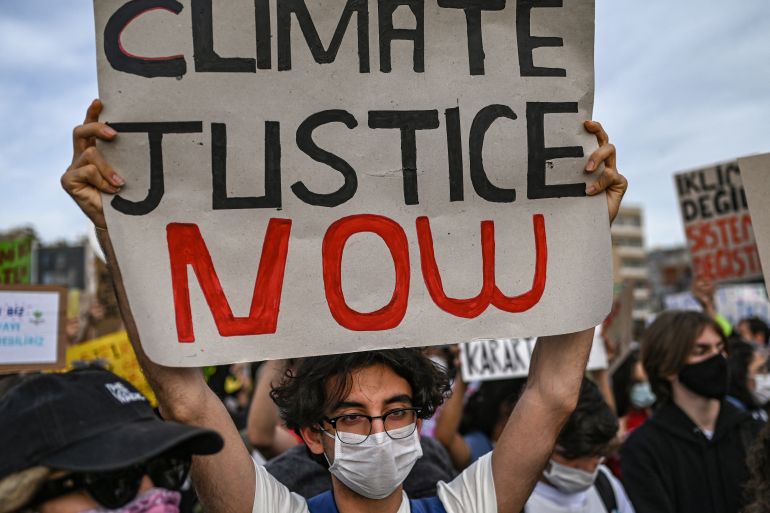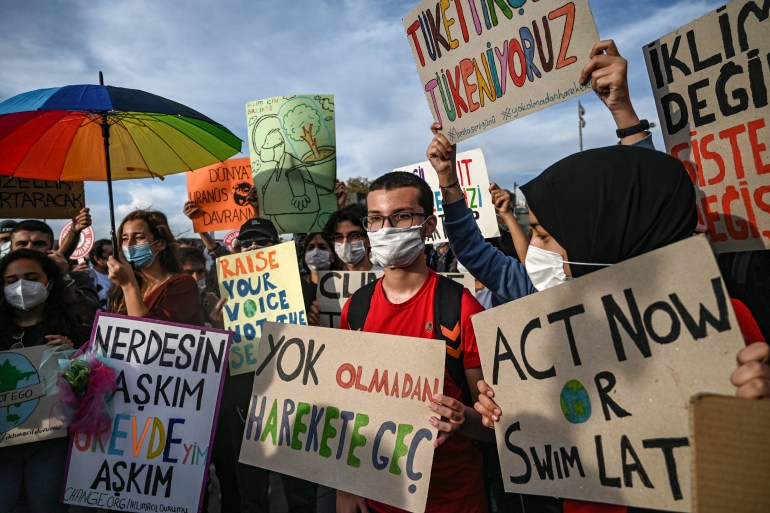Is Turkey really serious about climate change?
Plans to ratify the Paris climate agreement six years later are welcomed, but activists say major policy changes are needed.

Istanbul, Turkey – “They don’t care about the environment, they care about money, always money,” says Nurcan Keskin, a retired teacher as she takes a break from collecting signatures for a petition to save what Turkish climate activists say is a rare green space in this bustling metropolis of 16 million.
Home to birds and other wildlife, the 354,000-square metre (423,000-sq yard) Validebag Grove is a legally protected space, and its trees are part of the lungs of the city, absorbing greenhouse gases that cause global warming.
Keep reading
list of 4 itemsClimate change could displace 216 million by 2050: Report
‘Verge of the abyss’: Climate change to dominate UNGA talks
Climate change and famine | Start Here
It is also yet another flashpoint in what seems like a constant battle between Turkey’s government and environmental activists.
For more than 100 days now, Keskin and dozens of other activists have kept watch against bulldozers and police who would like to enter the grove and begin construction to transform it into a “People’s Garden” – part of a national programme the government has said will make tens of thousands of green spaces more accessible to the public.
More than 30,000 people though, have signed a petition against that development, which includes paving over trails and building a 500-space car park.
“They are presenting this as if they want to serve people. But that’s not the case,” says Arif Belgin, another activist at the grove. “They demolish green spaces so they can put up buildings instead. This is a protected natural area, but the state is not willing to preserve it, so we come and preserve it instead.”
‘A turning point’
Environmental activism has long been an explosive fault line in an already politically polarised Turkey. Plans to replace a park in central Istanbul in 2013 set off large protests and led to the arrest of hundreds of activists.
Despite opposition from activists, authorities went ahead and built a new northern highway and what will be the world’s largest airport near Istanbul, replacing forests that were supposed to be protected as part of the city’s growth plan.
Thousands of protesters marched against a Canadian-owned gold mine project in the western province of Canakkale in 2019 that activists said cut down hundreds of thousands of trees. And a plan to dig a 45km (28-mile) long alternate to the Bosporus through Istanbul is still scheduled to go forward even as environmentalists have said it would cut through important green preserves in the city.
But in recent weeks, President Recep Tayyip Erdogan, who regularly accuses environmental activists of standing in the way of the country’s economic progress, has signalled what the government has said is a change in priorities.
This month, Turkey plans to fully ratify the Paris agreement on climate change, which seeks to limit greenhouse gas emissions in the world to levels that keep global warming below two degrees Celsius (3.6 Fahrenheit) from pre-industrial levels.
By 2030, Turkish officials say they will reduce greenhouse gas emissions to 21 percent below expected levels, and by 2053, they plan to reach net-zero emissions, meaning green spaces and other natural carbon sinks would absorb all the greenhouses gases emitted in the country.
Turkey’s planned ratification came before COP26, the United Nations’ major conference in Glasgow, Scotland, on climate change to be held in November.
Turkey’s Environment and Urban Planning Minister Murat Kurum told reporters on Monday that his country will establish a “Climate Council” next year to bring together stakeholders and experts from all sectors of the economy and plan how to reach net-zero emissions.
“We are increasing our sink areas. We are increasing our natural protected areas, expanding our bicycle paths and green walking paths,” Kurum said.
It is that apparent contradiction in messaging – claiming to be protecting green areas on the global stage but pushing on with projects such as the People’s Garden in cities like Istanbul – that has environmentalists in Turkey worried.
“As climate activists, for many years in Turkey we have been demanding the Paris agreement be ratified, so it is an important achievement for Erdogan to make that statement,” Emine Ozkan, co-spokesperson for Turkey’s Green Party, told Al Jazeera.
“It’s a turning point for the climate movement, but we are discussing what will happen after this.”
Shifting geopolitical winds
Turkey was one of the first countries to sign the Paris agreement in 2015, but in the years following, Ankara insisted full ratification would only happen if it was listed among other “developing” countries, a classification that would make it eligible for funds from wealthier countries to meet their climate change goals.
“The Turkish delegation submitted requests almost every year after 2015,” said Umit Sahin, coordinator of climate change studies at Sabanci University’s Istanbul Policy Center. “But of course, this was not possible, because the decision should be taken unanimously, and developing countries were not on the same page as Turkey, they did not want Turkey to become another developing country because of climate finance, mostly.”
Ankara’s objection to being locked out of financial support is justified, said Karim Elgendy, an associate fellow with Chatham House and founder of Carboun, an advocacy initiative promoting sustainability in the Middle East North Africa region.
Turkey’s economy is among the largest in the world, earning it a place among groups like the G20, but its emissions per capita, Elgendy said, are below the global average. Turkey ranks 16th in the world in terms of emissions, according to the Global Carbon Atlas, and accounts for about 1 percent of global greenhouse gasses.
Turkey’s track record on mitigating its emissions is far better than those of other countries in the Middle East.
“If you consider Turkey to be equivalent to Germany in terms of availability of technology, availability of finance, and historic responsibility for carbon emissions, then you can certainly say that Turkey has not been doing enough to reduce its emissions,” Elgendy said.
“But if you consider Turkey to be closer to developing economies, you might be forgiven to ask why is it being asked to carry the burden for historic emissions when no one is supporting it.”
Floods, fires, and drought
Part of the reason Turkey is now ratifying the Paris agreement, Sahin said, is the realisation that it is not going to be reclassified as a developing country any time soon. But Sahin added there are also more practical reasons.
For starters, a year of floods, fires, and drought have brought the issue of climate change to the forefront of political discussions in Turkey.
A survey by Konda found 76 percent of voters thought natural disasters had become more frequent, and 87 percent of voters – including 81 percent in the ruling Justice and Development Party, or AK Party – thought global warming was a real phenomenon.
Overall, 75 percent of voters in Turkey, the survey found, were worried about climate change – a level of awareness matching, and exceeding in many cases, most European countries.

Rise of renewable energy
Meanwhile, a global shift away from coal has meant Turkey is rapidly replacing fossil fuels with renewables for its energy demands, which accounts for the vast majority of the country’s emissions.
About 34 percent of Turkey’s energy comes from coal today, and the country is just behind China and India in the global ranking of newly planned coal plants, according to a report from climate and energy think-tank Ember. But those new plants are highly likely to be cancelled as major financiers for coal such as China have said they will not continue backing the fossil fuel.
Renewables have instead stepped in, with about half of the country’s energy today coming from sources such as hydro, solar, and wind.
Turkey’s shift to renewable energy is to be lauded, Elgendy said, but if it intends to meet its net-zero goal for 2053, the country needs to come up with an overall policy shift and a detailed action plan. “The announcement to fully decarbonise is great, but we don’t know how they are going to achieve it.”
The country’s energy policy, especially, said Elgendy, repeatedly stresses “energy security and energy independence” instead of cutting greenhouse gas emissions.
Though its share has declined in recent years, oil and gas still account for about one-quarter of the country’s energy mix. And Turkey is locked in a dispute in the Eastern Mediterranean over rights to natural gas there with Greece and Cyprus, a high stakes naval standoff with the potential for a real war that could draw in Egypt, Israel, and others in the region.
That is just one of the apparent contradictions between Turkey’s global claims of fighting climate change and its domestic policies, said Koray Dogan Urbarli with the Turkish Green Party.
Government officials tout green policies in speeches, he said, but they “don’t know what kind of change is needed for that [and] what are the consequences of those changes. These are just slogans for them.”